Dave Bing facts for kids
Quick facts for kids
Dave Bing
|
|||||||||||||||||||||||||||||||||||||||
|---|---|---|---|---|---|---|---|---|---|---|---|---|---|---|---|---|---|---|---|---|---|---|---|---|---|---|---|---|---|---|---|---|---|---|---|---|---|---|---|
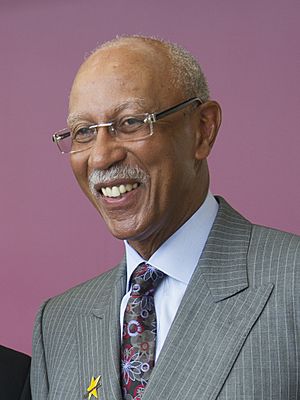
Bing in 2012
|
|||||||||||||||||||||||||||||||||||||||
| 74th Mayor of Detroit | |||||||||||||||||||||||||||||||||||||||
| In office May 11, 2009 – January 1, 2014 |
|||||||||||||||||||||||||||||||||||||||
| Preceded by | Kenneth Cockrel Jr. | ||||||||||||||||||||||||||||||||||||||
| Succeeded by | Mike Duggan | ||||||||||||||||||||||||||||||||||||||
| Personal details | |||||||||||||||||||||||||||||||||||||||
| Born | November 24, 1943 Washington, D.C., U.S. |
||||||||||||||||||||||||||||||||||||||
| Political party | Democratic | ||||||||||||||||||||||||||||||||||||||
| Spouse | Yvette Bing | ||||||||||||||||||||||||||||||||||||||
| Education | Syracuse University | ||||||||||||||||||||||||||||||||||||||
| Profession | Professional athlete, businessman, politician | ||||||||||||||||||||||||||||||||||||||
|
|||||||||||||||||||||||||||||||||||||||
David Bing (born November 24, 1943) is an American who was a famous professional basketball player. After his sports career, he became a successful businessman and later served as the 74th Mayor of Detroit, Michigan, from 2009 to 2014. He is a member of the Democratic Party.
Bing played 12 seasons in the National Basketball Association (NBA). He was a point guard, which means he was a player who leads the team's offense and handles the ball. He played for the Detroit Pistons (1966–1975), Washington Bullets (1975–1977), and Boston Celtics (1977–78). During his time in the NBA, he scored many points and made many assists. He was chosen for the NBA All-Star Game seven times and was named the game's Most Valuable Player in 1976. The Detroit Pistons honored him by "retiring" his jersey number 21, meaning no other player on the team can wear that number. He was also inducted into the Naismith Memorial Basketball Hall of Fame, which is a special place for basketball legends.
After basketball, Bing started his own company called Bing Steel. It was a steel processing business that grew into a very large company called the Bing Group. It became one of the biggest steel companies in Michigan.
In 2008, Bing decided to enter politics and run for mayor of Detroit. He won the election and became mayor in May 2009. He was re-elected for a full term later that year. However, during his time as mayor, Detroit faced many challenges, including financial problems. Bing decided not to run for re-election in 2013.
Contents
Early Life and Sports Beginnings
David Bing was born on November 24, 1943, in Washington, D.C. His mother, Juanita, was a housekeeper, and his father, Hasker, was a bricklayer and a church leader. David was the second of four children.
When he was young, his father gave him the nickname "Duke" because he always wanted to be the best. At age five, David had an accident that hurt his left eye, which affected his vision. His father also had a serious injury at work, which made young David decide he would never work in construction.
David loved sports, especially basketball and baseball. Even though some older kids said he was too small for basketball, he played very well. He even played against future music star Marvin Gaye. David was a big fan of the Brooklyn Dodgers baseball team and Jackie Robinson, who broke barriers in baseball.
High School Achievements
Bing went to Spingarn High School in 1958. He was great at baseball, but his basketball coach, William Roundtree, encouraged him to play basketball too. Coach Roundtree became like a father figure to David.
David became a strong basketball player, known for his jump shot and ability to drive to the basket. In his senior year, he had to choose between a baseball or basketball tournament. He chose basketball, hoping it would help him get a college scholarship, just like his hero Elgin Baylor. Bing led his team to victory in the tournament and was named MVP. He was also featured in Parade magazine and made the All-American Team in 1962.
College Basketball Career
Bing attended Syracuse University and wore jersey number 22, just like Elgin Baylor. He was roommates with Jim Boeheim, who later became a famous basketball coach.
Bing was the top scorer for the Orangemen for three years in a row (1964, 1965, and 1966). In his senior year, he was one of the top scorers in the nation and was named an All-American. This was a big honor for Syracuse.
During his three years at Syracuse, Bing averaged 24.8 points and 10.3 rebounds per game. He scored a total of 1,883 points and had 786 rebounds in 76 games. While at Syracuse, he also met Joe Biden, who was a law student there. Biden later became a U.S. Senator, Vice President, and President.
Professional Basketball Career
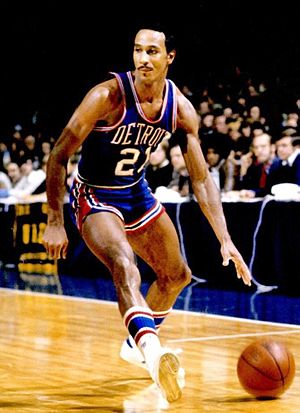
Bing's way of playing basketball was unique for his time. As a point guard, he was very athletic and explosive. He not only helped his teammates score but also scored a lot of points himself.
Playing for the Detroit Pistons (1966–1975)
In the 1966 NBA draft, the Detroit Pistons chose Bing as the second overall pick. He wore jersey number 21. In his first year, he scored 1,601 points (20.0 points per game) and won the NBA Rookie of the Year Award. The next year, in 1968, he led the entire NBA in scoring with 2,142 points (27.1 points per game).
In November 1968, Bing had an amazing game where he scored 39 points, grabbed 16 rebounds, and made 10 assists. This is called a "triple-double."
Bing missed some games in the 1971–72 season because of an eye injury. While with the Pistons, he played in six NBA All-Star Games (1968, 1969, 1971, 1973–1975). He was also named to the All-NBA First Team in 1968 and 1971, which means he was considered one of the best players in the league.
Playing for the Washington Bullets (1975–1977)
After leaving the Detroit Pistons, Bing played two seasons with the Washington Bullets. He was named an NBA All-Star again in 1976 and won the game's MVP Award.
Playing for the Boston Celtics (1977–1978)
He played his last season with the Boston Celtics, averaging 13.6 points per game. He retired from basketball after the 1977–1978 season.
Overall, in his 12-year NBA career, Bing played 901 games. He averaged 20.3 points, 6.0 assists, and 3.8 rebounds per game. He scored a total of 18,327 points.
Business Career
When Dave Bing was 22 and playing in the NBA, he tried to get a loan for a house but was turned down by a bank. This made him want to learn about business. So, during the basketball off-season, he worked at the bank in different departments.
After retiring from basketball, he worked at a steel processing company for two years.
Bing Steel
In 1980, Bing started his own company, Bing Steel, with just four employees. He used loans and his own money to get started. At first, the company struggled, but then it focused on being a middleman, helping other companies get steel. General Motors became their first big client.
By 1984, President Ronald Reagan honored Bing as the National Minority Small Business Person of the Year. By 1985, Bing Steel had grown to two plants with 63 employees and made $40 million in sales. The company's assets were sold in 2009.
The Bing Group
Bing Steel later became The Bing Group, a larger company with many different businesses. It supplied metal parts to the automobile industry, among other things.
In 1990, Bing received an award at the NBA All-Star Game for his success after his basketball career.
Early Political Involvement
Bing supported Kwame Kilpatrick early in his political career. However, when problems arose around Kilpatrick, Bing was one of the first business leaders in Michigan to ask him to resign as mayor of Detroit. Kilpatrick resigned in September 2008.
Bing also helped Detroit try to host the 2004 Democratic National Convention, a big political meeting. But Detroit lost to Boston in November 2002.
In January 2009, Bing received the National Civil Rights Museum Sports Legacy Award. This award honors athletes who have made important contributions to civil and human rights. Bing also volunteered with the Big Brothers Big Sisters of America program, helping young people.
Mayor of Detroit
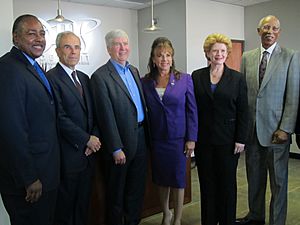
L-R: Ford Motor Company VP Tony Brown, Faurecia CEO Yann Delabrière, Michigan Governor Rick Snyder, Rush Trucking CEO Andra Rush, U.S. Senator Debbie Stabenow, and Bing
Becoming Mayor
On October 16, 2008, Bing announced he would run for mayor of Detroit. He wanted to finish the term of Kwame Kilpatrick, who had resigned. Bing won the primary election and then defeated the interim mayor, Kenneth Cockrel Jr., in May 2009. He was sworn in as mayor. Later that year, Bing was re-elected for a full term.
Leadership Style
Compared to the previous mayor, Bing was more quiet and didn't seek attention. He even chose not to take a salary as mayor for at least his first year. Bing was not afraid to make tough decisions, even if they were unpopular.
Financial Challenges and Economic Growth
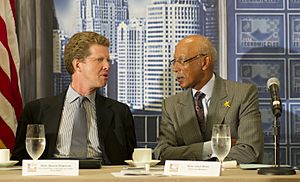
When Bing became mayor, Detroit was facing serious financial problems. The city had a large budget deficit. These financial issues continued during much of his time in office. However, by the time he left, the city's deficit had decreased.
Because the car industry is so important to Detroit, Bing was involved in talks about the 2009 auto bailout. He even spoke with Vice President Joe Biden, whom he had known since college.
Bing made some difficult budget proposals, including cuts to city services. He also reduced the number of city employees and changed contracts with trade unions. Many city workers faced lower salaries and benefits. Bing also hired outside companies to do some city jobs.
Despite the financial challenges, Detroit saw new private businesses open during Bing's time. Chrysler invested in a plant, creating new jobs, and businessman Dan Gilbert helped develop downtown Detroit.
Dealing with Blight
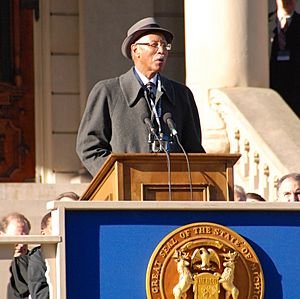
Bing wanted to tear down abandoned buildings and reduce city services in some areas. He hoped to encourage people to move from empty neighborhoods to more populated ones. This idea was controversial. Under Bing, the city demolished thousands of abandoned homes. He also started a program to help renovate foreclosed homes in certain neighborhoods.
Bing launched the Detroit Works Project, later called Detroit Future City. This project aimed to create a long-term plan for the city's future. He also worked to fix the city's broken street lights. He helped create a special authority to manage the lighting, and a contract was signed to repair the lights. Although the work happened after he left office, his efforts laid the groundwork for its success.
Policing and Crime
During Bing's time as mayor, the Detroit Police Department had some challenges. There were several changes in police chiefs. Even though crime was generally going down in other big U.S. cities, Detroit's homicide rate increased in 2012.
Other Projects
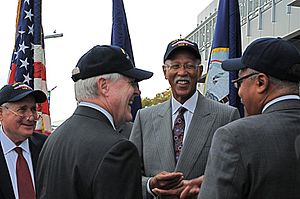
Early in his time as mayor, Bing worked on renovating Cobo Center, Detroit's main convention center. He also started a program called the Active and Safe Campaign to raise money for public safety and improve recreation facilities.
Emergency Management and Bankruptcy
In March 2013, Michigan Governor Rick Snyder appointed an emergency manager for Detroit because of the city's financial problems. This meant that the mayor, Dave Bing, lost much of his power. Bing said he disagreed with the decision but would work with the emergency manager, Kevyn Orr.
In July 2013, before Bing left office, Detroit became the largest city in U.S. history to declare municipal bankruptcy. This was a decision made by the emergency manager.
Not Seeking Re-election
Besides losing power to the emergency manager, Bing also had health problems. His approval ratings were low. On May 14, 2013, he announced he would not run for another term as mayor.
Later Activities
In 2014, Bing started the Bing Youth Initiative. This is a non-profit organization that helps young African American men in Detroit with school, behavior, and social well-being.
In August 2023, Bing supported Elissa Slotkin for the 2024 United States Senate election in Michigan.
Personal Life
Bing is the godfather of former NBA player Jalen Rose. In 2020, Bing published his autobiography called 'Attacking the Rim'.
Honors
- J. Walter Kennedy Citizenship Award (1977)
- Naismith Memorial Basketball Hall of Fame (inducted in 1990)
- Named one of the 50 Greatest Players in NBA History (1996)
- College Basketball Hall of Fame (inducted in 2006)
- NBA 75th Anniversary Team (2021)
- Syracuse Orange Ring of Honor (added in 2024)
Images for kids
See also
 In Spanish: Dave Bing para niños
In Spanish: Dave Bing para niños
 | Sharif Bey |
 | Hale Woodruff |
 | Richmond Barthé |
 | Purvis Young |


